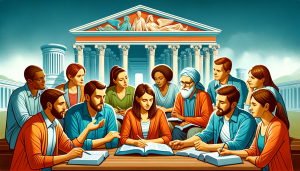Can Humans Become Gods? A Comprehensive Biblical Examination


The intersection of humanity and divinity has been a point of contention, fascination, and exploration for millennia. The Bible, foundational to Christian thought, provides a detailed tapestry of narratives, teachings, and prophecies that shed light on this subject. Our journey into understanding the biblical stance on the notion of humans attaining godhood is intricate, weaving through Old and New Testament scriptures, historical settings, and theological interpretations.
Central Scriptures Advocating the Idea:
- Genesis 3:22: “And Yehovah Elohim said, ‘Behold, the man has become like one of Us, knowing good and evil…'”
Genesis, the book of beginnings, sets the stage for humanity’s relationship with God. The story of Adam and Eve in the Garden of Eden is paramount. Their decision to eat from the Tree of Knowledge marked a significant turn. This verse is often interpreted as humans acquiring a divine-like knowledge. However, a deeper dive reveals it more as a lament about humanity’s loss of innocence than an elevation to divinity.
- Psalm 82:6: “I said, ‘You are gods, And all of you are sons of the Most High.'”
The Psalms, a collection of prayers, hymns, and laments, offer a window into the spiritual and emotional landscape of ancient Israel. Psalm 82 is a divine council scene where God addresses the “gods” or “elohim” in Hebrew. In ancient Near Eastern cultures, divine councils comprised gods who assisted the chief god. In the Israelite context, these “gods” could be angelic beings or human rulers. The title doesn’t imply true divinity but a role of governance or representation.
- John 10:34: “Yeshua answered them, ‘Is it not written in your Law, ‘I said, you are gods’?’.”
The New Testament records Yeshua’s life, teachings, and the establishment of the early Christian church. In the Gospel of John, Yeshua’s identity as the Son of God is a central theme. This verse, where He quotes Psalm 82:6, is His response to the Jewish leaders accusing Him of blasphemy. Yeshua uses it to challenge their understanding and highlight His unique divine identity.
- 2 Peter 1:4: “…you may be partakers of the divine nature…”
Peter’s epistles provide guidance for believers in a rapidly growing and diverse Christian community. This verse is often cited to support the idea of humans partaking in God’s nature. However, it’s essential to understand that “divine nature” here refers to God’s moral attributes, not His essence.
- Revelation 3:21: “To him who overcomes, I will grant to sit with Me on My throne…”
The book of Revelation, a prophetic vision given to John, is filled with symbolic and apocalyptic language. This promise to believers doesn’t suggest they become gods but that they will share in Yeshua’s victory and reign.
Counterpoints from the Bible and Contextual Understandings:
Many other scriptures emphasize the distinction between God and humans. For instance:
- Isaiah 45:5: “I am Yehovah, and there is no other; besides Me, there is no God.”
Isaiah’s prophecies, set against the backdrop of Assyrian and Babylonian threats, repeatedly underscore Yehovah’s unmatched sovereignty. The prophet’s message is clear: Yehovah is unparalleled.
- Deuteronomy 4:35: “To you, it was shown that you might know that Yehovah, He is God; there is no other besides Him.”
Moses, after leading the Israelites out of Egyptian bondage, reiterates the foundational belief of monotheism. Deuteronomy, a book of reminders and laws, emphasizes Yehovah’s unique relationship with Israel and His unmatched divinity.
- 1 Timothy 2:5: “For there is one God, and there is one mediator between God and men, the man Yeshua the Messiah.”
Paul’s epistles to Timothy provide pastoral guidance. Here, Paul emphasizes monotheism and Yeshua’s unique role, bridging the gap between God and humanity.
The Necessity of Context in Biblical Interpretation:
To grasp the Bible’s teachings fully, one must consider various factors:
- Historical Setting: Understanding the socio-political and historical background of a scripture is pivotal. For example, knowing the Babylonian exile’s impact on Israelite thought can provide depth to our understanding of Isaiah’s prophecies.
- Literary Context: Recognizing the type of literature (e.g., poetry, prophecy, epistle) can guide interpretation. Poetry, like the Psalms, often uses metaphorical language, while epistles address specific issues faced by early Christian communities.
- Original Language: The Bible, written in Hebrew, Aramaic, and Greek, has linguistic nuances. Words like “elohim” in Hebrew can mean “gods,” “God,” or even “judges,” depending on the context.
Conclusion:
The Bible, with its rich tapestry of stories, prophecies, and teachings, provides a multifaceted view of God and humanity’s relationship. While there are verses that, on the surface, suggest a potential for human divinity, a comprehensive and contextual study reveals a consistent theme: God is unique in His essence, and while humans are made in His image and can partake in His attributes, they remain distinct from Him in nature.
Properly engaging with the Bible requires a commitment to study, prayer, and consultation with trusted theological resources, ensuring that interpretations align with the broader biblical narrative.
References:
- “Biblical Theology of the Old and New Testaments” by Brevard S. Childs.
- “How to Read the Bible for All Its Worth” by Gordon D. Fee and Douglas Stuart.
- “The Canon of Scripture” by F.F. Bruce.
- “Introduction to Biblical Interpretation” by William W. Klein, Craig L. Blomberg, and Robert L. Hubbard Jr.

